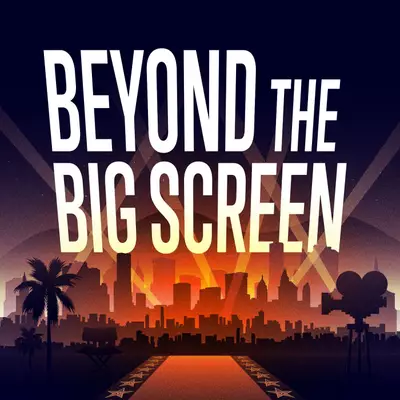Listen on Your Favorite App
Blade Runner (1982) – Lost In Time, Like Tears in Rain
January 20, 2022
00:00
39:25
Listen on Your Favorite App
Title: Blade Runner (1982) – Lost In Time, Like Tears in Rain
Description: Today we are joined by our frequent guest, Erik Fogg of the Reconsidered Podcast to talk about a trailblazing piece of science fiction, 1982’s Blade Runner starring Harrison Ford, Rutger Hauer and More. We will continue to examine the themes this movie evokes. It is more than just the singularity and the role of artificial intelligence. The movie makes us wonder what it really means to be human.
Learn More About our Guest:
Erik Fogg of the Reconsider Podcast
www.reconsidermedia.org
You can learn more about Beyond the Big Screen and subscribe at all these great places:
www.beyondthebigscreen.com
Click to Subscribe:
https://www.spreaker.com/show/4926576/episodes/feed
email: steve@atozhistorypage.com
www.beyondthebigscreen.com
https://www.patreon.com/historyofthepapacy
Parthenon Podcast Network Home:
parthenonpodcast.com
On Social Media:
https://www.facebook.com/groups/atozhistorypage
https://www.facebook.com/HistoryOfThePapacyPodcast
https://twitter.com/atozhistory
Music Provided by:
"Crossing the Chasm" Kevin MacLeod (incompetech.com)
Licensed under Creative Commons: By Attribution 3.0 License
http://creativecommons.org/licenses/by/3.0/
Image Credits:
https://www.cnet.com/news/blade-runner-and-alien-tv-shows-confirmed-by-ridley-scott/
Begin Transcript:
, [00:00:00] this is beyond the big screen podcast with your host, Steve Guerra. This is part two of a two-part conversation on the 1982 movie blade runner with Eric and Zander from the podcast reconsider. I highly suggest you go back and listen to part one of this conversation. Don't worry, we'll be waiting for you beyond the big screen.
You brought up those ideas of niche, Nietzschean and, um, the Christian elements and all of those really come together. One Roy confronts, Dr. Tyrrell. What happens there. And what, how do those themes all tie together that you've brought up, that you brought up earlier? I it's funny. I, I, as I was making my notes, I was thinking, oh, this is my favorite scene.
Now this is my favorite scene. [00:01:00] Now this one, and I have six, I realized six favorite scenes. So this is one of them. And what happens is, uh, Roy finally gets to Dr. Tyrrell by. Tricking Sebastian and then coercing Sebastian, uh, and they get access. What's interesting by is by playing and finishing the same moves as what's called the immortal game in chess.
So it's a famous 18 hundreds chess game where. The, I forget the guy's name, um, whatever, where the guy who ended up winning sacrifice, tons of pieces to fool his opponent, into making a move that exposed the king. And so we had checkmate with some minor pieces at the end. Um, those pieces of course, represent those minor pieces, represent the, uh, the replicants who are treated like pawns.
The king of course is Dr. Tyrrell. And so once. Makes those moves over the phone. [00:02:00] Tyrrell actually, Roy tells Sebastian to do it. Sebastian makes those moves over the phone and Tyrell is very impressed and he says something must be on your mind. Sebastian, come on in. And then big reveal. Roy is there Tyrrell, doesn't seem to surprise.
He actually says like, oh, I'm surprised it took you so long to get here. He knew that Roy was coming to talk to him. They have this discussion over whether Tyrrell can give Roy more life, uh, but Tyrrell cannot. And they, in that discussion, Tyrrell tries to reason with Roy saying that he's lived this incredible.
Powerful. Um, flourishing life, especially compared to other humans. And he has the quote, the candle that burns twice as bright, burns, half as long. It's this great scene of his face being very fatherly. And in fact, of course being the character of God, he created Roy. He decided how long Roy got to live. Um, and he's judging Roy as having lived a good life and sort of saying it's okay for you to die.[00:03:00]
And here's where the Nietzschean moment. Uh, God reveals himself to be powerless, to
Description: Today we are joined by our frequent guest, Erik Fogg of the Reconsidered Podcast to talk about a trailblazing piece of science fiction, 1982’s Blade Runner starring Harrison Ford, Rutger Hauer and More. We will continue to examine the themes this movie evokes. It is more than just the singularity and the role of artificial intelligence. The movie makes us wonder what it really means to be human.
Learn More About our Guest:
Erik Fogg of the Reconsider Podcast
www.reconsidermedia.org
You can learn more about Beyond the Big Screen and subscribe at all these great places:
www.beyondthebigscreen.com
Click to Subscribe:
https://www.spreaker.com/show/4926576/episodes/feed
email: steve@atozhistorypage.com
www.beyondthebigscreen.com
https://www.patreon.com/historyofthepapacy
Parthenon Podcast Network Home:
parthenonpodcast.com
On Social Media:
https://www.facebook.com/groups/atozhistorypage
https://www.facebook.com/HistoryOfThePapacyPodcast
https://twitter.com/atozhistory
Music Provided by:
"Crossing the Chasm" Kevin MacLeod (incompetech.com)
Licensed under Creative Commons: By Attribution 3.0 License
http://creativecommons.org/licenses/by/3.0/
Image Credits:
https://www.cnet.com/news/blade-runner-and-alien-tv-shows-confirmed-by-ridley-scott/
Begin Transcript:
, [00:00:00] this is beyond the big screen podcast with your host, Steve Guerra. This is part two of a two-part conversation on the 1982 movie blade runner with Eric and Zander from the podcast reconsider. I highly suggest you go back and listen to part one of this conversation. Don't worry, we'll be waiting for you beyond the big screen.
You brought up those ideas of niche, Nietzschean and, um, the Christian elements and all of those really come together. One Roy confronts, Dr. Tyrrell. What happens there. And what, how do those themes all tie together that you've brought up, that you brought up earlier? I it's funny. I, I, as I was making my notes, I was thinking, oh, this is my favorite scene.
Now this is my favorite scene. [00:01:00] Now this one, and I have six, I realized six favorite scenes. So this is one of them. And what happens is, uh, Roy finally gets to Dr. Tyrrell by. Tricking Sebastian and then coercing Sebastian, uh, and they get access. What's interesting by is by playing and finishing the same moves as what's called the immortal game in chess.
So it's a famous 18 hundreds chess game where. The, I forget the guy's name, um, whatever, where the guy who ended up winning sacrifice, tons of pieces to fool his opponent, into making a move that exposed the king. And so we had checkmate with some minor pieces at the end. Um, those pieces of course, represent those minor pieces, represent the, uh, the replicants who are treated like pawns.
The king of course is Dr. Tyrrell. And so once. Makes those moves over the phone. [00:02:00] Tyrrell actually, Roy tells Sebastian to do it. Sebastian makes those moves over the phone and Tyrell is very impressed and he says something must be on your mind. Sebastian, come on in. And then big reveal. Roy is there Tyrrell, doesn't seem to surprise.
He actually says like, oh, I'm surprised it took you so long to get here. He knew that Roy was coming to talk to him. They have this discussion over whether Tyrrell can give Roy more life, uh, but Tyrrell cannot. And they, in that discussion, Tyrrell tries to reason with Roy saying that he's lived this incredible.
Powerful. Um, flourishing life, especially compared to other humans. And he has the quote, the candle that burns twice as bright, burns, half as long. It's this great scene of his face being very fatherly. And in fact, of course being the character of God, he created Roy. He decided how long Roy got to live. Um, and he's judging Roy as having lived a good life and sort of saying it's okay for you to die.[00:03:00]
And here's where the Nietzschean moment. Uh, God reveals himself to be powerless, to
More Episodes
See all episodes
Meet Your Host

Steve Guerra is a historian and podcaster who hosts three different shows. He started with the History of the Papacy Podcast in 2013. In 2017, Steve began Beyond the Big Screen, a podcast that delves into the fascinating stories behind films through lively interviews. His newest show, Organized Crime and Punishment, takes a deep dive into the roots, evolution, and impact of organized crime across different cultures and countries.
